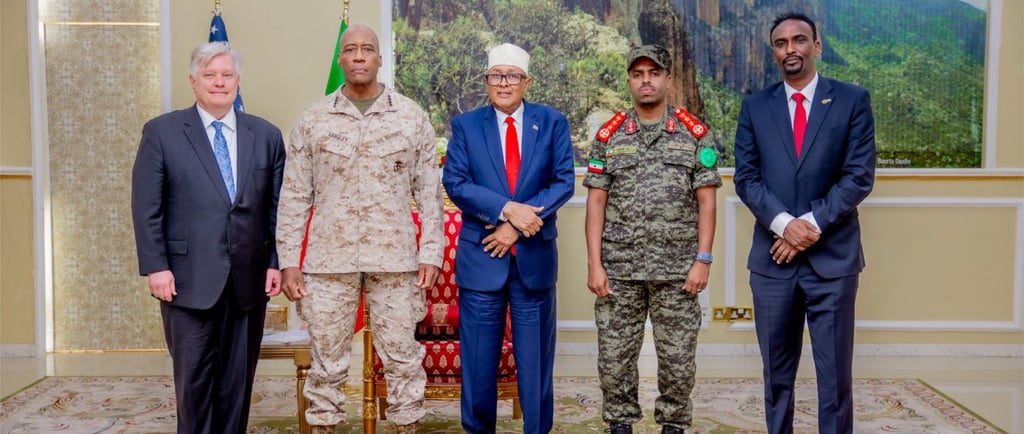Strategic Shifts in US Policy Towards Somaliland: Motives and Possible Scenarios
Ahmed Gamal Al-Sayad – Political Science Researcher
7/14/20253 min read


A quiet but significant shift is underway in the Horn of Africa. The United States is showing unprecedented interest in Somaliland, the self-declared republic that has maintained remarkable stability for over three decades without international recognition. This pivot, driven by rising competition with China and shifting regional alliances, is forcing a major rethink in Washington.
The central question now is no longer if the U.S. will engage with Somaliland, but how. The answer could redraw the geopolitical map of one of the world's most critical regions.
Somaliland: A Stable Island in a Turbulent Sea
Since declaring independence from Somalia in 1991, Somaliland has built a functioning state from the ground up. With its own president, a bicameral legislature, and a judicial system that blends modern law with traditional customs (known as Xeer), it has achieved a level of peace and democratic governance that stands in stark contrast to the chaos that has often engulfed its neighbors.
Through vigorous diplomatic outreach, Somaliland has established representative offices in key capitals, including Washington, London, and Taipei. It has pursued high-level visits and signed bilateral agreements, all in a relentless quest for the international recognition it believes it has earned.
Washington's Calculus: Why Somaliland, and Why Now?
The growing U.S. interest in Somaliland is not accidental. It is a calculated response to a new geopolitical reality, driven by three primary motives:
1. The Unrivaled Strategic Location
Somaliland sits on an 850-kilometer coastline along the Gulf of Aden, a vital artery for global trade. Its Port of Berbera overlooks the Bab al-Mandab Strait, a chokepoint through which a huge portion of the world's commerce passes. In an era of rising maritime threats, including Houthi attacks on shipping, a stable partner in Somaliland offers the U.S. a crucial strategic asset to protect global trade and conduct counter-terrorism operations.
2. Countering China's Dominance
China has systematically expanded its economic and military footprint across the Horn of Africa. Its first-ever overseas military base is in Djibouti, a key node in its Belt and Road Initiative. As Beijing's influence grows, Washington is seeking partners to counterbalance its regional dominance. Somaliland, which has notably established diplomatic ties with Taiwan, offers the U.S. a rare opportunity to build a partnership with a nation relatively free of Chinese influence.
3. Waning Confidence in Djibouti
For years, the U.S. has relied on its massive military base in Djibouti, Camp Lemonnier. However, Djibouti's deepening ties with China and its refusal to allow U.S. attacks against the Houthis from its territory have eroded Washington's confidence. Prominent policy proposals, like the right-leaning "Project 2025," explicitly recommend recognizingSomaliland as a preemptive move to secure U.S. interests should its position in Djibouti deteriorate further.
The Signs of a Policy Shift
While the U.S. has not yet made a formal declaration, the signs of a deepening relationship are clear and growing:
Congressional Action: Bipartisan legislation has been introduced in the U.S. Congress to study and even formalize direct relations with Somaliland.
"Project 2025" Recommendation: The influential policy roadmap for a potential Trump administration explicitly calls for recognizing Somaliland's sovereignty.
High-Level Visits: The U.S. Ambassador to Somalia and the commander of U.S. Africa Command (AFRICOM) recently met with Somaliland's president in Hargeisa and visited the Port of Berbera, signaling deepening security cooperation.
These moves suggest Washington is laying the groundwork for a more formal and direct engagement, regardless of what form it ultimately takes.
Three Possible Futures for U.S. Policy
As Washington calibrates its approach, its policy toward Somaliland will likely follow one of three paths:
Scenario 1: Full and Formal Recognition
In this bold scenario, the U.S. would become the first country to officially recognize Somaliland as a sovereign state. This would cement American influence, secure access to the Port of Berbera, and create a powerful counterbalance to China. However, this high-risk, high-reward move would likely shatter U.S. relations with Somalia, provoke strong opposition from regional and international powers, and risk destabilizing the Horn of Africa.
Scenario 2: Strategic Partnership Without Recognition
A more pragmatic approach would be to deepen the strategic partnership across security, economic, and diplomatic domains without formal recognition. This would allow the U.S. to achieve its core strategic goals—like security cooperation at the Port of Berbera—while avoiding the destabilizing fallout of full recognition. For Somaliland, it would offer de facto legitimacy and tangible support. This "have your cake and eat it too" strategy represents a mutually beneficial middle ground.
Scenario 3: A Mediated Political Settlement
The U.S. could use its influence to broker a political settlement between Somaliland and Somalia, potentially creating a federal framework that grants Somaliland broad autonomy. This path would align with the policies of many international partners and could resolve the long-standing crisis peacefully. By fostering a durable consensus, the U.S. could help create a more stable and unified partner in the region.
A New Chapter for the Horn of Africa
The relationship between the United States and Somaliland is at a critical inflection point. While full recognition remains a complex and risky proposition, the era of U.S. indifference is clearly over. The path Washington chooses will have profound and lasting consequences, not only for the future of Somaliland but for the security and stability of the entire Horn of Africa. The world is watching.
Download the full study here.
Empowerment
Amplifying African voices for sustainable progress together.
Contact US
Growth
Street No. 3281, N'Djamena, Republic of Chad.
© 2024. All rights reserved.